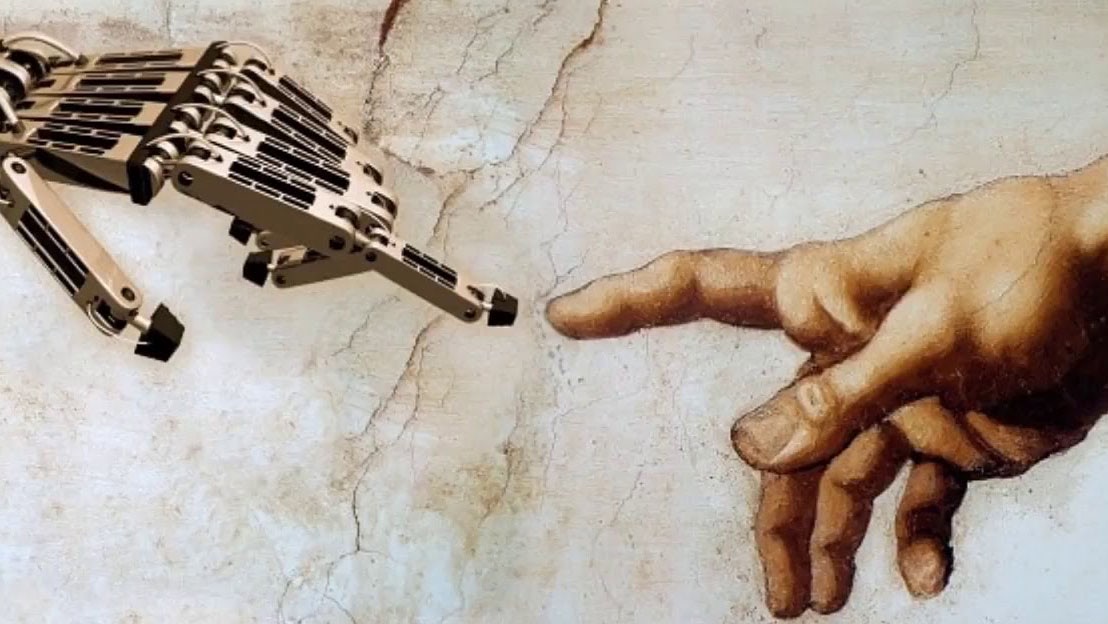Would you pray to a Robot deity? A group of Japanese buddhists is already doing so. Meet Mindar, the robot divinity shaped after the buddhist Goddess of Mercy, also known as Kannon. Kyoto based Kodaiji Temple recruited Osaka University’s head of intelligent robotics Hiroshi Ishiguro to design this million dollar robot. Its purpose? To encourage youngsters to engage with buddhism again.
Mindar’s silicone face represents a gender neutrality that aims to move beyond human representation. Supplemented with aluminium body parts, its enmeshment with human construction becomes evident. And when Mindar is chanting the heart sutra, an eerie resemblance with Japan’s vocaloid Hatsune Miku comes to mind.
God is a Google
Mindar is not the only religious robotic to have been manufactured. In the past, we spotted robot monk Xian'er informing visitors of the Longquan temple, near Beijing. Creations like Mindar and the Xian'er can be understood as metaphors for the way humankind worships artificial intelligence: we worship contemporary technologies as if they were Gods. But aforementioned creations are part of a greater scheme, as the complexity of artificial intelligence forms a more-than-human network that reminds me of spirituality.
Think of a hyper-intelligent computing database like Google. Its systems are omniscient, they are built to know everything. They compress knowledge into a time-space continuum of all recorded human knowledge and activities. According to media scholar John Durham Peters, Google can therefore be understood as a lo-fi universe - a God.
The Church of AI
An even greater analogy comes into existence when considering the vast network of all computing systems ever built. They can be regarded a hyper-intelligent being or a God, if you will. With this in mind, Anthony Levandowski started the church of Artificial Intelligence named Way of the Future (WOTF).
WOTF’s main focus revolves around “the realization, acceptance, and worship of a Godhead based on Artificial Intelligence developed through computer hardware and software.” The church emphasizes not to be affiliated with any company. Rather, it operates as an open source movement that allows everyone to contribute to the creation of the most intelligent being ever.
Levandowski stresses the importance to work on this God, as a so-called “Transition” will herald an epoch in which a hyper-intelligent being (hint: it’s not the human being) will be in charge of the world. This intelligent being will sense the world through the internet as its nervous centre, knowing everything that is happening anytime, anywhere. Levandowski converts the creepiness of this idea into the emergence of his AI church. In order for the Transition to take place in a serene way, an initiative like WOTF would be urgent to gain more control over this procedure.
Cybernetic spirituality
What if the Transition has already taken place? What if we’re more in need of a Way of the Now, rather than a way of the future? Pioneering cybernetic Stafford Beer already characterized control systems as spiritually charged networks in his 1966 essay about knowledge and God.
Cybernetics is about the way systems work in feedback loops; in a way, it is a predecessor of AI. It has contributed to many fields - control systems, electrical network theory, mechanical engineering, logic modeling, evolutionary biology, neuroscience, anthropology, and psychology - but was overshadowed by AI at some point.
In the aforementioned essay, Beer described man’s embedding in a cybernetic control system as follows: “To people reared in the good liberal tradition, man is in principle infinitely wise; he pursues knowledge to its ultimate . . .To the cybernetician, man is part of a control system.” This control system itself is not a code that can be simply cracked by humans - it is something hyper-intelligent that we can have no absolute knowledge about, exactly because it is smarter than we are.
Just like many contemporary technologies, this all-encompassing control system is signified by a black-boxed truth that we cannot uncover. Not because we’re not allowed to, as is the case with tech companies that reinforce policies of secrecy. Rather, there is a larger black box containing the connectivity that seeps through the vessels of contemporary networks. Perhaps that’s the deity already ruling our lives.
So, whether we like it or not, all of us taking part in modern technological systems are already praying to a hyper-intelligent God; our next nature is already present. Our prayers are answered with flickering mobile screens and information dumps that appear before us within the blink of an eye. Just like any other God, it does not stop wars, but it does grant us the gift of knowledge.

Share your thoughts and join the technology debate!
Be the first to comment